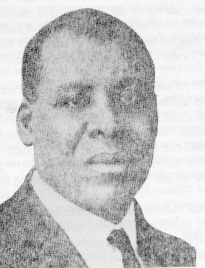 Born in
Chatfield, Texas, on June 19, 1872, Sutton E. Griggs was an orator, a minister,
a write, and a publisher. He was educated in the Dallas public schools
and at Bishop College in Mars Hall, Texas. Upon completing his studies
at Richmond Theological Seminary (Virginia Union University) in l893, he
was ordained and spent the next two years as pastor of the First Baptist
Church at Berkeley, Virginia. During this period, he married Emma Williams,
a public school teacher.
Born in
Chatfield, Texas, on June 19, 1872, Sutton E. Griggs was an orator, a minister,
a write, and a publisher. He was educated in the Dallas public schools
and at Bishop College in Mars Hall, Texas. Upon completing his studies
at Richmond Theological Seminary (Virginia Union University) in l893, he
was ordained and spent the next two years as pastor of the First Baptist
Church at Berkeley, Virginia. During this period, he married Emma Williams,
a public school teacher. In 1899, Griggs moved to Nashville to become the corresponding secretary of the National Baptist Convention and the pastor of First Baptist Church, East Nashville. He left several years later to become pastor of Tabernacle Baptist Church of Memphis; he spent one year as the pastor of the Hopewell Baptist Church in Denison, Texas. Later, he returned to serve as Tabernacle pastor.
In Memphis, Griggs organized in 1914 the National Public Welfare League, which promoted social efficiency among Afro-Americans and interracial cooperation. He was a disciple of W. E. B. DuBois and a supporter of the Niagara Movement and the newly founded National Association for the Advancement of Colored People. In 1930, Griggs left Memphis to return to Hopewell Baptist Church in Denison. He later resigned this position to go to Houston, Texas, to establish the National Religious and Civic Institute.
Although Griggs is known and respected as a leader in the Baptist church, it is as a writer--more specifically, a novelist--that he has received most attention. During his lifetime, Griggs wrote more than thirty-three books, five of them novels. In 1901, while in Nashville, he established and operated the Orion Publishing Company; here he published, promoted, and sold his own works to the Afro-American community. The works published by Orion were predominantly novels, which combined facts and fiction to present the plight of an oppressed people and a solution. These novels focused on the political issues, the definition or image, and the dignity and survival of black Americans. It is not for his literary style or technique that Griggs is studied, but for his response to the racial injustices of his day, for his defense and portrayal of the humanity and dignity of his people, and his suggestion of what could happen if racial persecution continued. He has been called a "militant" by some and an "accommodationist" by others, while another portion of his audience views Griggs as vacillating between the two philosophies. Whatever label is applied to Griggs, he used ridicule, reason, sympathy, and fear in his novels to address racism in America; he, like Martin Delany in his novel, Black, extols the black-skinned hero.
His early novels, Imperium in Imperior (1899) and He Hindered Hand; or, The Reign of the Repressionist (1905), are responsible for most of the attention Griggs has received. Imperium in Imperior focuses upon the classic responses to American life by Afro" Americans: assimilationism and nationalism. The issue of participation in the American democratic idea is presented through the account of a national Negro political organization, which is designed to unite all Negroes in an active body, and the actions of two main characters. One of them is a nationalist and one an assimilationist; one is black-skinned and one a mulatto. In the novel's development, Griggs reflects the tenor of the day: miscegenation, oppression, Jim Crowism, political exploitation of the black man, and the Negro's lack of protection. The Hindered Hand depicts the cruel and tragic results of miscegenation, racial injustices, and the question of emigration to Africa. It also is an attack upon the plantation literature of Griggs's day by such white writers as Thomas Nelson Page and Thomas Dixon, Jr.; specifically, it is an attack against the propaganda in Dixon's The Leopard's Spots. A Romance of the White Man's Burden, 1865-l900.
Some sources list his death in 1930, but it is believed that Sutton Griggs died January 5, 1933.